|
|
|
Sort Order |
|
|
|
Items / Page
|
|
|
|
|
|
|
| Srl | Item |
| 1 |
ID:
173169
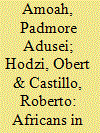

|
|
|
|
|
| Summary/Abstract |
Relations between China and African nations have intensified following the ratification of several multilateral and bilateral developmental agreements, especially after the third Forum on China-Africa Cooperation (FOCAC) summit in 2006. In the past decade, the relations have transcended to the micro-level, with important implications for households and individuals. Of note are the varying forms of population migration between the two places for reasons ranging from business ventures, education, asylum-seeking and family making and reunification. Using various primary and secondary data sources, the seven articles in this special issue delve into the wellbeing, social identities and different kinds of socio-cultural and economic inequalities of Africans in China and Chinese in Africa. Altogether, the articles affirm that policies and mechanisms to ensure decent living conditions, enhanced sense of belonging and social equity among Africans in China and Chinese in Africa are critical to the future of China-Africa relations.
|
|
|
|
|
|
|
|
|
|
|
|
|
|
|
|
| 2 |
ID:
173176
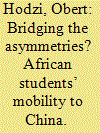

|
|
|
|
|
| Summary/Abstract |
African students’ mobility to China is growing – making China the second most popular destination for African students studying abroad, after France. Generally, due to the pervasive poverty and inequality in African states, educational mobility is a means to escape individual socio-economic challenges for the transformation of lives. However, is the African students’ mobility to China able to achieve those expectations? Through a critical analysis of current scholarship in African student education mobility the paper explores the underlying material and ideational motivations of China’s education support in Africa. In probing Africans’ educational mobility to China, the paper pushes the boundaries of enquiry beyond the surface of affordable education. Examining the asymmetries emerging from African students’ mobility to China and questioning the bridging effect of educational mobility, the paper finds that education aid and development in Africa have always been a factor of external powers’ domestic and foreign interests.
|
|
|
|
|
|
|
|
|
|
|
|
|
|
|
|
| 3 |
ID:
166615
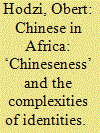

|
|
|
|
|
| Summary/Abstract |
This introduction presents background information to a special issue exploring the complexities of the Chinese identity and forms in which ‘Chineseness’ is expressed by Chinese migrants in Africa. Existing literature and media reports on the Chinese in Africa assumes that they are a homogenous group, this introductory article argues to the contrary. The Chinese diaspora in Africa range from descendants of migrants that settled in Africa in the seventeenth century to twenty-first century migrants. This historical and contemporary engagement between China and African countries is essential to understanding the diversity and hybridity of Chinese identity in Africa. This observation provides the basis for the six articles in this special issue. Based on ethnographic observation and in-depth interviews with the Chinese diaspora and locals in Zimbabwe, Ghana, Zambia and South Africa, the articles provide a compelling argument on why there is no single Chinese identity in Africa.
|
|
|
|
|
|
|
|
|
|
|
|
|
|
|
|
| 4 |
ID:
180070
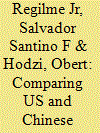

|
|
|
|
|
| Summary/Abstract |
China is emerging as a key state actor in international development – a sector that has been dominated by the United States for decades. US and Chinese foreign aid programs can be compared on the basis of several benchmarks: 1) official state definition and accounting of foreign aid programs; 2) historical foundations and origins; 3) sectoral distribution, particularly in terms of the professed goals and objectives of the aid program; 4) nature of targeted recipient actors; 5) institutional mechanisms for delivery in recipient countries. Notwithstanding particular differences, Chinese and US foreign aid portfolios demonstrate their respective strategic political and economic interests in two ways: they shape the domestic politics of recipient countries in ways that accommodate the donor government’s policy preferences, and they enhance the social reputation and legitimacy of the donor state in the international system.
|
|
|
|
|
|
|
|
|
|
|
|
|
|
|
|
| 5 |
ID:
178260
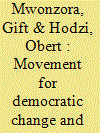

|
|
|
|
|
| Summary/Abstract |
Nelson Chamisa is central to the political terrain of contemporary Zimbabwe. Post the soft coup of November 2017 and the death of Morgan Tsvangirai in early 2018, Chamisa became president of the Movement for Democratic Change party and contested the July 2018 presidential election. The tempo of changes in the Movement for Democratic Change presidency is not related directly to the shift from Mugabe to Mnangagwa. However, broader politics formed an important context for Chamisa’s contested claim for the Movement for Democratic Change presidency. In examining Chamisa and the Movement for Democratic Change, the article highlights linkages between personality politics and electoral mobilization, and how this relates to political party institutionalization.
|
|
|
|
|
|
|
|
|
|
|
|
|
|
|
|
| 6 |
ID:
134355
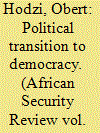

|
|
|
|
|
| Summary/Abstract |
This paper argues that the crisis of electoral democracy in Zimbabwe and Cote d'Ivoire is a result of underlying structural and institutional deficiencies within national and regional multinational institutions. It assesses the extent to which they have been ‘enablers’ or ‘spoilers’ of electoral-based transitions to democracy. Yet it avoids generalisations of the security sector's involvement in political transitions. In terms of structure, the paper is divided into four sections. Section one will briefly discuss the theoretical perspectives of the election-democracy trajectory. It argues that although elections are a major variable for democracy, unless the ‘ecology of elections’ is conducive, elections may not be an instrument of transition to democracy. The second section analyses the militarisation of politics and the role of the security sector in aiding or stalling democratisation. Section three will assess the role of regional organisations such as the Southern African Development Community, Economic Community of West African States and the African Union in electoral-based political transitions in Africa. Lastly, the paper will discuss how the security sector and multinational African institutions can aid political transitions to democracy in troubled African countries.
|
|
|
|
|
|
|
|
|
|
|
|
|
|
|
|
|
|
|
|
|